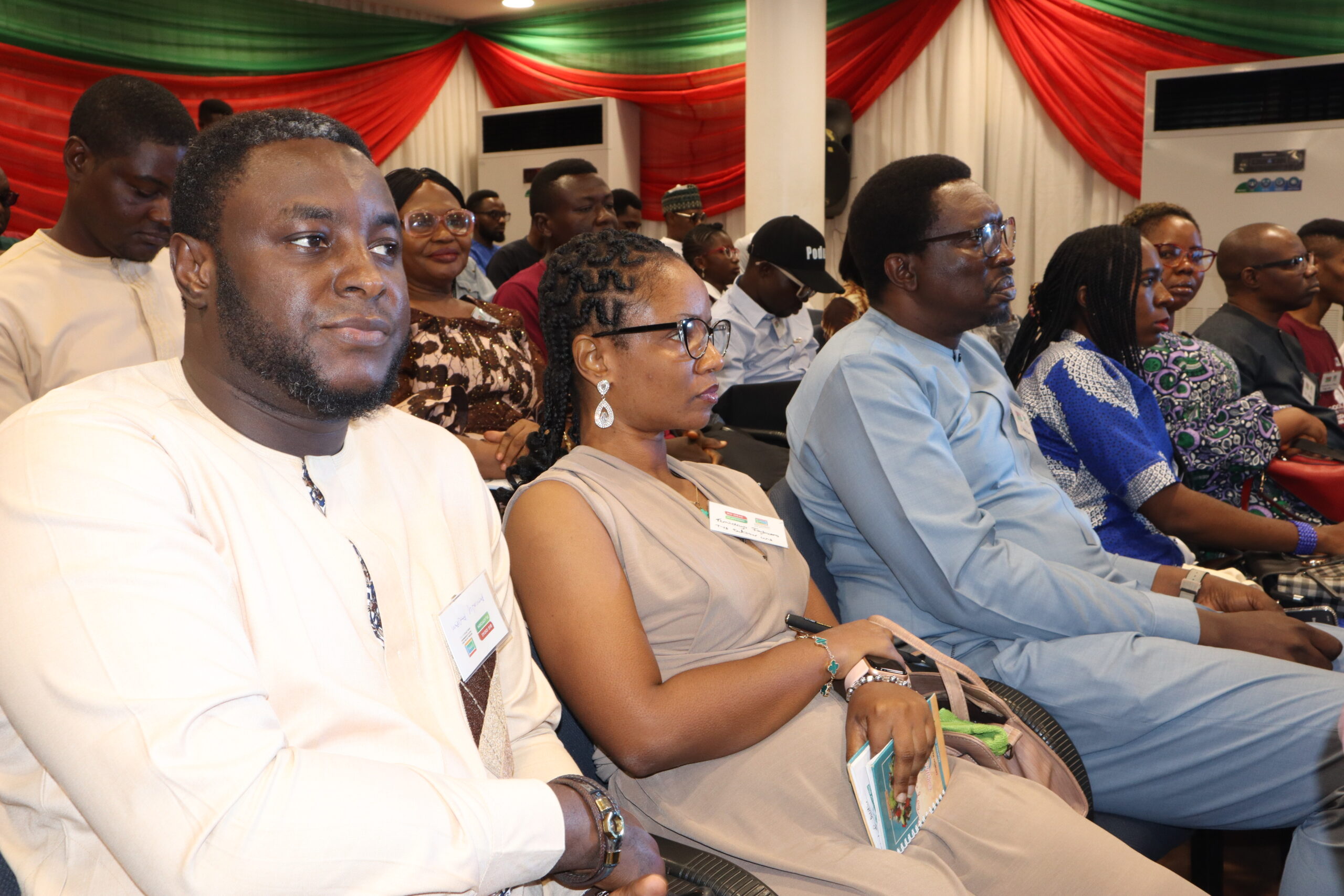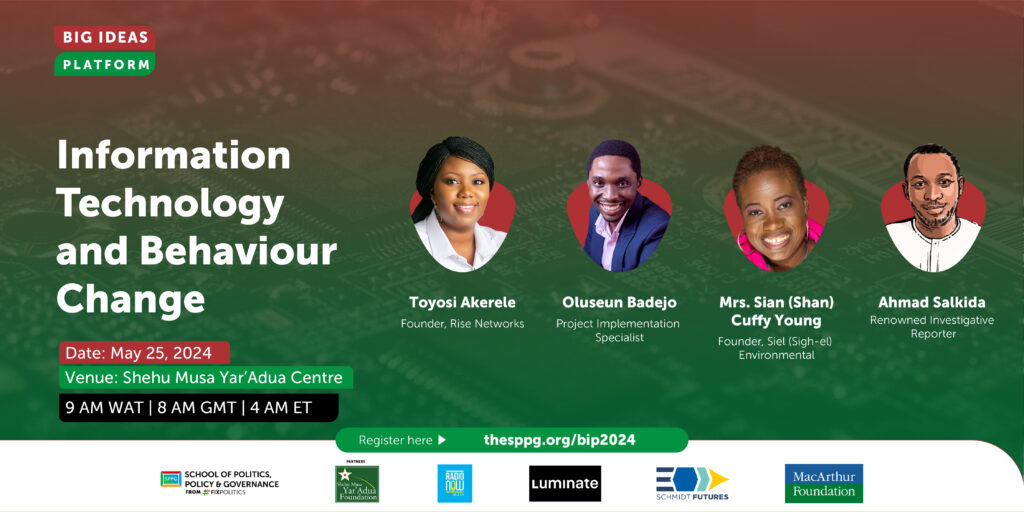Big Ideas Platform 2024: Recap of the Bold Ideas for Africa's Renaissance
[Abuja – May 25, 2024] – The School of Politics, Policy, and Governance (SPPG), in partnership with the Yar’Adua Foundation and MacArthur Foundation, hosted the Big Ideas Platform 2024 on Saturday, May 25, at the Shehu Musa Yar’Adua Centre in Abuja. The event, themed ‘Information Technology and Behavior Change’ centred on leveraging technology and socio-behavioural programming as ‘game changers’ for Africa's transformation.
The event kicked off with an opening remark by the CEO of SPPG, Alero Ayida-Otobo “Technology is truly a game changer, playing a pivotal role in addressing significant developmental challenges across sectors in Africa: Communication, Commerce, Medicine, Education, Security, Food Production, and so much more." The platform spotlighted four subthemes - blockchain technology, environmental awareness, virtual reality, and artificial intelligence (AI) - and had four of Africa’s bright minds share their big ideas.
Four Big Ideas Curators
Oluseun Badejo, project implementation specialist and team lead of the SPPG Blockchain Project shared his big idea on deploying blockchain technology deployment in the educational sector to address critical issues like certificate forgery, data alteration, and ensure that academic records are secure, accessible, authentic, and verifiable by employers and academic institutions without the hassle of running back to your alma mater each time your academic records are requested, scratch the traditional filing of academic records which takes time to find and has resulted to people losing academic and professional opportunities. This technology could be revolutionary in addressing the rampant issue of fake transcripts in Nigeria and across Africa. This will offer a secure and cost-effective solution for verifying academic credentials.
Speaking in a session on waste management tools, Sian Cuffy Young, an award-winning waste management consultant, educator and social entrepreneur, and founder of Siel (Sigh-el) Environmental, a highly successful social enterprise that revolutionises waste perception and practices for individuals and businesses, shared her big idea on how to create environmental awareness in children, educate them so they can make informed environmental choices. She emphasised that effective environmental change begins with an individual commitment to sanitise our environment as a personal responsibility. Her big idea cites the ‘innovative use of educational books and animations targeted at younger generations to underscore the need for teaching practical waste management skills early’. This focus on proactive methods over interventionist awareness campaigns will drive lasting environmental change.
Sabiqah Bello, representing Ahmad Salkida, the CEO of HumanAngle, a niche media platform using virtual reality to humanise Africa’s conflict, humanitarian, and development issues to evoke empathy, talked about their groundbreaking exploration of virtual reality (VR) in journalism. Offering a glimpse into the future of digital storytelling, the session illustrated VR's ability to immerse viewers in the lived experiences of others, enhancing empathy and understanding. For journalists, VR technology represents a powerful tool for conveying emotional and impactful narratives, potentially transforming the framing and dissemination of news stories.
Toyosi Akerele-Ogunsiji, Technology Education Professional, and Founder of Rise Networks and Passnonwnow, shared her big idea highlighting the critical role of artificial intelligence (AI) for information verification in today’s data-heavy world. Akerele emphasised AI's capacity to identify false reports, a key factor in combating misinformation. She also stressed the importance of integrating AI courses into educational curricula to prepare Africa’s growing population of AI users. By investing in AI, Africa can enhance its global competitiveness, ensuring that students and professionals are equipped with the necessary skills to utilise AI effectively.
Here's a critical commentary by Toyosi Akerele-Ogunsiji on AI
The VillageSquare Conversation
But beyond these big ideas, there was a question of how to scale them to transform Africa and build a better future. Dr Amina Salihu, the Deputy Director Africa Office of the MacArthur Foundation, pioneer Dean of SPPG and the lead of SPPG’s thought-leadership, led this conversation during The VillageSquare Conversation. Ajibola Amzat, a Nigerian investigative journalist, pointed out that technology can be useful but can be used as a weapon the other way round. Prof Remi Sonaiya, Nigerian politician and educationalist, and one-time presidential candidate, cited that the real challenges we face involve the ethical use of technology. She warned that technology, like a knife, can be a tool for good or harm and that the focus should be on the ethical dimension, character, competence, and capacity. However, Frank Nweke Jnr, a Nigerian Politician, Entrepreneur, Teacher and Social Innovator, and two-time Federal Minister cautioned that Africa is not represented in discussions on the global agenda regarding artificial intelligence. He added that the world will continue to have needs, and those with artificial intelligence expertise will be crucial in meeting them. On the other hand, Dr Obiageli ‘Oby’ Ezekwesili, Founder and Chair of the #FixPolitics, shared her concerns that it is the rate of the dearth of ideas that distinguishes one country from the other, one continent from the other, and reaffirmed SPPG’s determination to ensure that these big ideas will give resultant transformation in our continent.
The 2024 Big Ideas Platform proved to be an enlightening experience that offered attendees and uptakers a wealth of knowledge on the transformative potential of technology in addressing some of the continent's most pressing issues.
As the event concluded, it was clear that the big ideas, insights, and innovations presented hold significant promise for driving positive change in Africa. The 2024 Big Ideas Platform successfully highlighted the critical intersection of technology and development, leaving attendees eager to take action for social impact across Nigeria and the broader African continent.
Join us, let's co-create the Africa we need.
About the Big Ideas Platform: The Big Ideas Platform is a thought leadership initiative developed by the School of Politics, Policy, and Governance. With a focus on empowering African innovators and amplifying their voices, this platform aims to promote dialogue, collaboration, and action to address the pressing challenges faced by African communities. By highlighting transformative ideas, the Big Ideas Platform strives to facilitate inclusive growth, development, and the realization of the African Renaissance.
The Use of Artificial Intelligence in Detecting Fake News - #BigIdeasPlatform2024isHere
The spread of fake news has become a serious issue in today's digital age and challenges the foundation of our information society. In the modern day of social media rapid communication, the spread of false or misleading information disguising it as trustworthy journalism has achieved unmatched popularity. Fake news is a powerful force that affects all facets of our lives because it is so simple to generate false narratives and spread them to a large audience. The effects of fake news are severe and widespread, whether they involve politically driven misinformation efforts, sensationalised health claims, or false financial news.
The adverse effects of fake news are many and serious. It undermines people's confidence in trustworthy information sources and makes them doubtful of mainstream media and reputable institutions. The foundation of an educated society is being undermined by this lack of trust, creating uncertainty and false information. Fake news has the ability to sway public opinion, stir up anxiety, and even have an impact on important decisions like political elections. The democratic process is seriously endangered by the use of disinformation to manipulate public opinion. Therefore, the capacity to recognize fake news is crucial. It not only helps people make informed decisions, but it also protects the integrity of our information environment.
Advancements in Artificial Intelligence (AI) have significantly simplified daily human activities. Developed by OpenAI, the Chat Generative Pretrained Transformer (ChatGPT) serves as an example of these AI technologies. ChatGPT operates as a text-based conversational agent, providing textual responses to user queries. AI algorithms have been shown to be useful in detecting fake news or misinformation that may be interfering with efficiency and optimization. Proponents of using AI in the detection of fake news suggest that certain principles need to be followed, including the development of strategies by software designers to combat fake news, enabling software users to report fake news when detected, and keeping users informed of the dissemination of fake news. For example, deep learning, machine learning, and natural language processing can extract text- or image-based cues to train models to aid in the prediction of the authenticity of news. Alternatively, AI can be used to examine the social context of the news article, including features of the poster, such as the number of shares or retweets of the post. However, Generative AI tools like ChatGPT can also facilitate the spread of misinformation or fake news to the detriment of those seeking information on virtually any topic, particularly health, finances, and politics. In extreme cases, the spread of misinformation through the use of AI-generated videos or written content can set factions against one another, with violence.
The prevalence of large language models like ChatGPT in various domains, from healthcare to information dissemination, is undeniable. While they show promise in democratizing access to information and aiding in research, ethical and accuracy-related challenges loom large. Notably, the models’ capacity for generating misleading or false information raises ethical concerns, such as in the realm of fake news generation. The consequence extends from eroding trust in AI systems to affecting user perceptions, as corroborated by empirical studies. Additionally, personal harm can befall users as misinformation about health and finances, among other things, is generated and disseminated. Data ownership, user consent, and representational bias are additional layers of complexity in this discourse. Therefore, it is crucial to address these issues comprehensively for the responsible and equitable application of these potent tools in diverse sectors.
In our battle against the trend of fake news on social media, Artificial Intelligence offers powerful tools for mitigating the spread of misinformation, but its deployment must be accompanied by careful consideration of ethical, societal, and technical implications. Understanding fake news is as convoluted as understanding human behaviour. Consequently, fighting it requires multifaceted strategies. Considering that the technology that counters fake news is the same technology that created it, neutralizing it may take more than just the expertise of top tech companies. The potential methods of detection and neutralization through AI form the basis of the discussions that we will be having at the Big Idea Platform 2024.
In 2023, The School of Politics, Policy & Governance (SPPG) partnered with the Shehu Musa Yar’Adua Foundation to launch the inaugural Big Ideas Platform, centered around "Reawakening the African Renaissance: Pathways to Inclusive Growth and Development." Five innovative African leaders shared groundbreaking ideas aimed at improving African communities' quality of life. This year, The School of Politics, Policy & Governance (SPPG) is excited to announce Big Ideas Platform 2024, in collaboration with the Shehu Musa Yar’Adua Foundation, on May 25th, 2024. This year's theme, "Information Technology and Behaviour Change," will convene intellectuals, policymakers, technocrats, and changemakers to discuss transformative ideas and solutions for Africa's inclusive prosperity and sustainable development.
The event is open to the public, and registration is free. It will be a great opportunity to learn from thought leaders and professionals about how Artificial Intelligence can be harnessed not only to combat fake news but also to improve Africa's economy and enhance its development.
Date: May 25, 2024 (Africa Day)
Time: 9:00 AM – 12 PM WAT (GMT+1)
Venue: Shehu Musa Yar'Adua Center, Abuja/ Zoom



